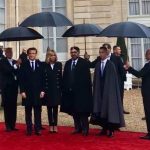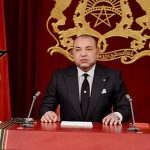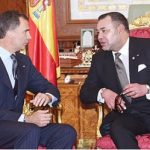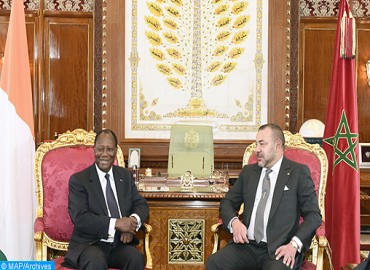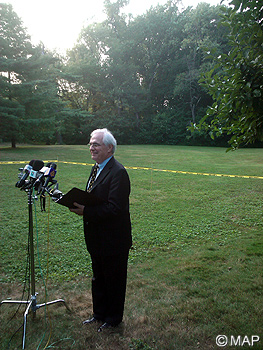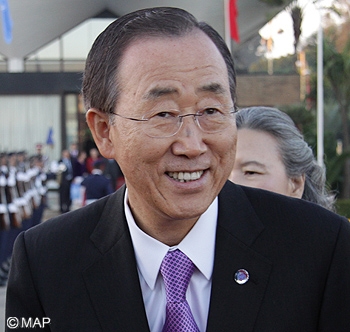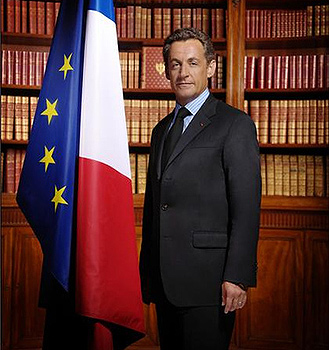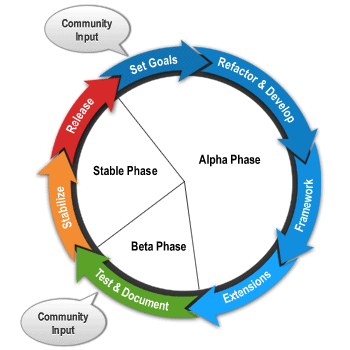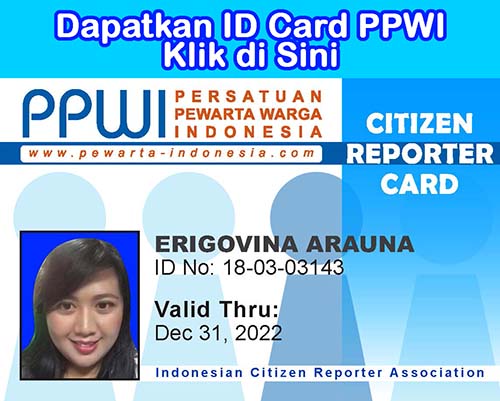HM The King Addresses Message To Participants In The 13th Fikr Conference Of The Arab Thought Foundation
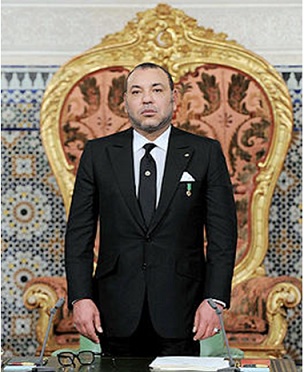 PERSISMA, Skhirate – HM King Mohammed VI addressed a message to participants in the 13th “Fikr” conference of the Arab Thought Foundation, that opened this Wednesday in Skhirate.
PERSISMA, Skhirate – HM King Mohammed VI addressed a message to participants in the 13th “Fikr” conference of the Arab Thought Foundation, that opened this Wednesday in Skhirate.
Here follows the full text of the message:
“Praise be to God
May peace and blessings be upon the Prophet, His Kith and Kin
Mr. Chairman,
Ladies and Gentlemen,
We are very proud that the Kingdom of Morocco – the land of dialogue and the crossroads of civilizations – is hosting the thirteenth FIKR Conference, to which I have gladly granted my high patronage.
I should like, first of all, to say how much I esteem the Arab Thought Foundation, under the leadership of my brother His Royal Highness Prince Khalid Al-Faisal bin Abdul Aziz Al Saud, and the members of its Board of Trustees and Board of Directors. They have all been making every effort to raise awareness of the Arab Nation’s basic principles and values, and to promote thought and creativity in the Arab world.
I also would also like to commend the Foundation on its activities, which provide a platform that is conducive to constructive dialogue, enlightening debate and a fruitful exchange of views between academics, thinkers, political and cultural figures as well as members of the media on some of the most important Arab and international issues in the world today.
In this regard, I commend your choice of theme for the current Conference: “Arab integration: the dream of unity and the reality of division,” which closely reflects Arab reality today, considering the rapid changes the Arab world is currently witnessing.
This is a good opportunity to reiterate the tremendous responsibility of Arab intellectuals and their role in raising awareness, enlightening people and objectively analyzing the situation in Arab countries. Through your meeting today, you are showing how aware you are of that responsibility, and how keen you are to contribute to building more bridges of unity and fraternity between the peoples of the Arab world, to achieve integration and to promote solidarity between all members of the Arab Nation.
Ladies and Gentlemen,
What unites Arab countries exceeds what divides them. Indeed, their unity is rooted in the rock-solid foundation of history and a shared civilization. In addition to being geographically contiguous, our countries are characterized not only by harmony at the human level, but also by complementarity in terms of their immense human and natural resources. As for Arab peoples, they are united by faith, language, culture and blood ties, in addition to fraternity and a common destiny.
What is deeply and painfully saddening, however, is the division and disunity currently characterizing Arab relations. Indeed, ties between most Arab countries are affected by the consequences of long-running inter-Arab disputes, pointless internal conflicts and growing sectarianism, extremism and terrorism.
Moreover, some of these countries are wasting their peoples’ resources on fictitious causes and artificial disputes which fan the flames of disunity and separatism.
In view of the above situation – which is rejected by Arab peoples – promoting complementarity has become an urgent necessity. Given the growing challenges in the Arab world and beyond, it is now important to address the situation from a new, realistic angle.
Although Arab countries have, for decades, sought to lay the groundwork for integration as a first step towards unity – signing, to this end, several agreements and announcing bold decisions at various conferences – results have been disappointing, falling well short of official and popular aspirations.
Nevertheless, Arab unity is not an unattainable dream, nor is it a shimmering mirage. It is a legitimate aspiration which can be fulfilled; it is also a strategic necessity to which everyone is called upon to give substance.
Arab complementarity does not mean living in isolation or shutting ourselves off from the world. It must be a catalyst for consolidating the Arab role and clout in Africa and Asia, and for expanding our relations with influential regional and international groupings.
Having missed out on many dates with history, the Arab world is called upon to ensure that complementarity no longer remains a slogan that is postponed indefinitely.
Complementarity is not only a means to promote development, but it is also an unavoidable necessity for survival in the face of all-powerful coalitions and groupings. Without complementarity, we would either disappear or remain meaningless entities, with no real clout in the international arena.
Ladies and Gentlemen,
Arab countries are at a crossroads today. They are facing development and security challenges as well as pressing popular aspirations for further rights and freedoms, and greater human dignity and social justice.
These challenges and aspirations can only be addressed through complementarity, unity and integration.
It is high time we restored Arab cohesion and closed our ranks, resolutely and in good faith, in order to rise to the real challenges facing Arab peoples, using a comprehensive, multi-dimensional approach.
This cannot be accomplished unless we achieve inter-Arab reconciliation, overcome the causes of division and disunity, unify our stances and consolidate Arab joint action, making sure the sovereignty and territorial integrity of our States are respected. Moreover, the League of Arab States should be reformed and its powers expanded, given that it is our common home and the ideal platform for addressing Arab issues and preparing development plans to promote unity.
The economy is a key element in consolidating our unity and achieving integration for development. This is the basis for building an influential Arab bloc at regional and international levels. To this end, Arab States are called upon to make the most of opportunities for economic complementarity and to seek to achieve genuine economic integration that promotes mutual investments. Such measures should pave the way for the setting up an Arab common market, particularly through the implementation of the Agadir Free Trade Agreement and the promotion of solidarity for the benefit of all Arab peoples.
The abundant natural resources available in the region should be a factor for unity and harmony, not a cause of division and disunity.
In this respect, if we manage to make existing regional blocs operational, they will become a real catalyst for the fulfilment of our ambitions regarding complementarity and unity. To this end, a participatory, inclusive approach which is open to all stakeholders, involving government authorities, elected bodies, the private sector and civil society organizations should be adopted.
While the Gulf Cooperation Council is resolutely moving toward greater Gulf unity, it is indeed saddening that the Maghreb Union remains in an unacceptable state of lethargy for reasons that will serve the interests of no one. Such a situation will only prolong the status quo, make Maghreb peoples more frustrated than ever and cause them to lose confidence in the future.
At grass roots level, we should build more bridges of communication and understanding between Arab citizens, open borders to them, give them access to jobs and enable them to interact with their regional environment. We should involve Arab citizens in the knowledge and communication-based society and encourage initiatives undertaken by civil society groups, which have become influential actors in the decision-making process.
I am sure you realize the importance of the role to be played by intellectuals as a counterbalance and as a powerhouse of proposals, in terms of both awareness-raising and the defense of Arab peoples’ best interests.
True intellectuals are the conscience of the nation. They share their fellow citizens’ concerns and aspirations and commit to defending their causes; they also wholeheartedly embrace the principles of Arab unity and are impervious to ideologies and political considerations.
Ladies and Gentlemen,
Being deeply committed to Arab fraternity and to solidarity, Morocco will always remain open to initiatives aimed at promoting unity.
As it firmly believes that ours is a common destiny and that we should be making the most of Arab commonalities, my country will spare no effort for the emergence of an influential Arab bloc that can defend and uphold the just causes of the Arab Nation as well as its vital interests.
In keeping with its commitment to promote culture and creativity, Morocco calls on Arab intellectuals to enhance communication between Arab elites and peoples so as to promote a comprehensive Arab intellectual revival that will contribute to consolidating the unity of Arab peoples.
In this respect, Arab peoples do not expect this important intellectual gathering to engage in a mere critical analysis of the current Arab situation or to lament a glorious past. They want you to diagnose the root causes of the current situation impartially and objectively, to exchange views on how to contribute to changing it, and to help lift the Arab world to a status worthy of the aspirations of its sons and daughters.
Thanks to the eminent experts and distinguished intellectual, political, academic and media figures taking part in this conference – who not only have a vast experience but who also care deeply about Arab unity – I am sure you will adopt constructive recommendations and proposals that will help us overcome the current state of disunity and nurture hope for a better future, in which fraternity, unity and solidarity will prevail.
I would like to extend a warm welcome to our distinguished guests and wish them a pleasant stay in Morocco. May the Almighty grant you every success in your endeavors.
Wassalamu alaikum warahmatullah wabarakatuh.”

